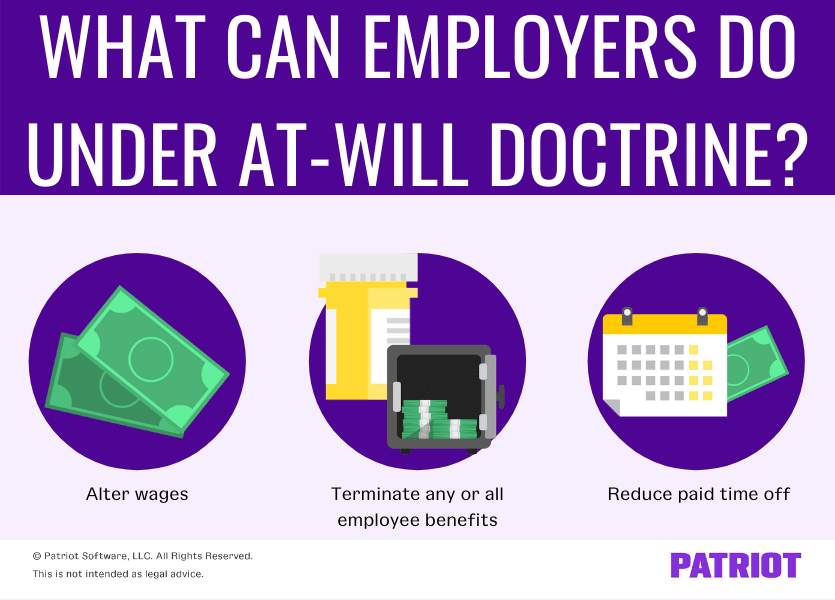When you hire employees, the excitement is high. But sometimes, you get someone in a position that doesn’t quite work out the way you thought it would. So, you make the tough decision to let the employee go from your business or change the employment relationship (e.g., move the employee to another department). When this happens, what do you have to consider? Is it even legal? That’s where at-will employment comes in.
What is at-will employment?
At-will employment applies to both employees and employers. The employment at-will definition says the employee or employer may terminate the employment relationship at any time for any reason.
Employers cannot terminate an employee for illegal reasons (e.g., discrimination). But, if the reason is legal, the employer can terminate the employee and face no legal consequences. Likewise, at-will employees can leave employment at any time for any reason (or no reason!) without legal consequences.
What is just cause?
Employers in states with at-will employment do not have to provide “just cause” for termination. Neither the employer nor the employee have to provide any notice when terminating at-will employment.
Employees who are not subject to an employment at-will doctrine as defined by the state (e.g., employees with well-defined contracts) may only be terminated by an employer for “just cause.”
But, what is just cause? If you terminate an employee who falls under just cause agreements, the termination must be both fair and reasonable. With just cause, you must give the employee a reason for their termination.
Oftentimes, you need to conduct an investigation and provide clear proof that the employee’s actions reasonably resulted in their termination. You may also need to provide a warning or notice to your employee prior to terminating their employment.
What else does at-will employment cover?
When it comes to at-will employment, many people think of termination or quitting a job. However, an employment at-will doctrine applies to more than just employees leaving a position.
Legally, employers can do the following under an at-will doctrine:
- Alter wages (e.g., pay decrease)
- Terminate employment benefits (e.g., health insurance)
- Reduce paid time off (PTO)

Keep in mind that any changes to an employee’s wages, benefits, or time off policies must still follow your state’s laws. You cannot pay less than the legal minimum wage or provide less paid family leave or paid sick leave than what is required by law.
States with at-will employment
Forty-nine states and Washington D.C. are at-will employment states. The only state that does not have employment at will is Montana. But, Montana employers can still exercise at-will policies during a probationary period.
What are the exceptions to at-will employment?
In general, there are three common employment at-will exceptions:
- Public policy
- Implied contract
- Implied covenant of good faith and fair dealing
Public policy exceptions
Most state laws or statutes recognize public policy exceptions to at-will employment. However, these exceptions may be more broad in some states than in others.
Under public policy exceptions, you may not terminate an employee who:
- Reports illegal activities (e.g., not following child labor laws)
- Refuses to perform illegal activities (e.g., refusing to commit perjury)
- Exercises any statutory rights (e.g., filing workers’ compensation claims)
- Is involved in acts of public interest (e.g., participating in jury duty)
Typically, these public policy exceptions may be considered retaliatory and do not fall under an at-will employment doctrine.
States that do not have public policy exceptions are:
- Alabama
- Florida
- Georgia
- Louisiana
- Maine
- Nebraska
- New York
- Rhode Island
The other 42 states and Washington D.C. have public policy exceptions to an at-will employment agreement. Check with your state for more information about public policy exceptions.
Implied contract
In many states, employees can use an implied contract to fight termination of employment. Implied contracts are written or spoken statements that give an employee the expectation of a fixed or indefinite employment.
Have you ever said something like, “Don’t worry, we do not dismiss employees without giving them the opportunity to correct their behavior.”? Or, have you told an employee, “We need great workers like you!”? If so, you may have an implied contract.
What about your handbook or company policies? Did you send an email reassuring an employee that they were doing a great job? Written communications or policies may provide evidence of an implied contract. Consider adding an employee acknowledgment of at-will employment in your employee handbook. Add a form that requires a signature proving the employee received a copy.
Not all states accept implied contracts to fight wrongful termination. The following states do not accept implied contracts:
- Arizona
- Delaware
- Florida
- Georgia
- Indiana
- Louisiana
- Massachusetts
- Missouri
- Montana*
- North Carolina
- Pennsylvania
- Rhode Island
- Texas
- Virginia
*Montana does not have an at-will employment doctrine. Therefore, it does not allow for implied contracts.
Implied covenant of good faith and fair dealing
Only some states have an exception of implied covenant of good faith and fair dealing. Under this exception, bad faith or malicious termination are prohibited. This exception is also known as the implied in-law exception.
What is a bad faith termination? Well, there is not one set definition. But typically, a bad faith termination is when you let go of an employee to avoid paying wages or benefits. For example, firing a retirement-age employee to avoid paying benefits is a bad faith termination.
Again, not all states recognize the covenant of good faith and fair dealing. The states that have implied covenant of good faith exceptions include:
- Alabama
- Alaska
- Arizona
- California
- Delaware
- Idaho
- Massachusetts
- Montana
- Nevada
- Utah
- Wyoming
Who is not subject to at-will employment doctrine?
Not all employees are considered to be at-will even if your business is in an at-will state. Employees who are not considered at-will are those covered by:
- Collective bargaining agreements
- Defined company policies detailing when and how the company can terminate employees
- Individual employment contracts
Unions or employment associations typically have contracts which detail reasonable termination provisions. Usually, the agreements have a clause about just cause termination and an appeals process.
Your company policies might also outline the process of employee termination, including whether or not you issue warnings.
Some industries and organizations hire employees and provide individual employment contracts. The contracts give specific employment terms and discharge conditions.
Are your filing cabinets overflowing with employee documents, handbooks, and other paperwork? Patriot’s online payroll software has a convenient, easy-to-use HR software add-on that lets you store important documents electronically. And, you can easily share handbooks and paperwork with your employees through a free employee portal. Start your 30-day free trial today!



